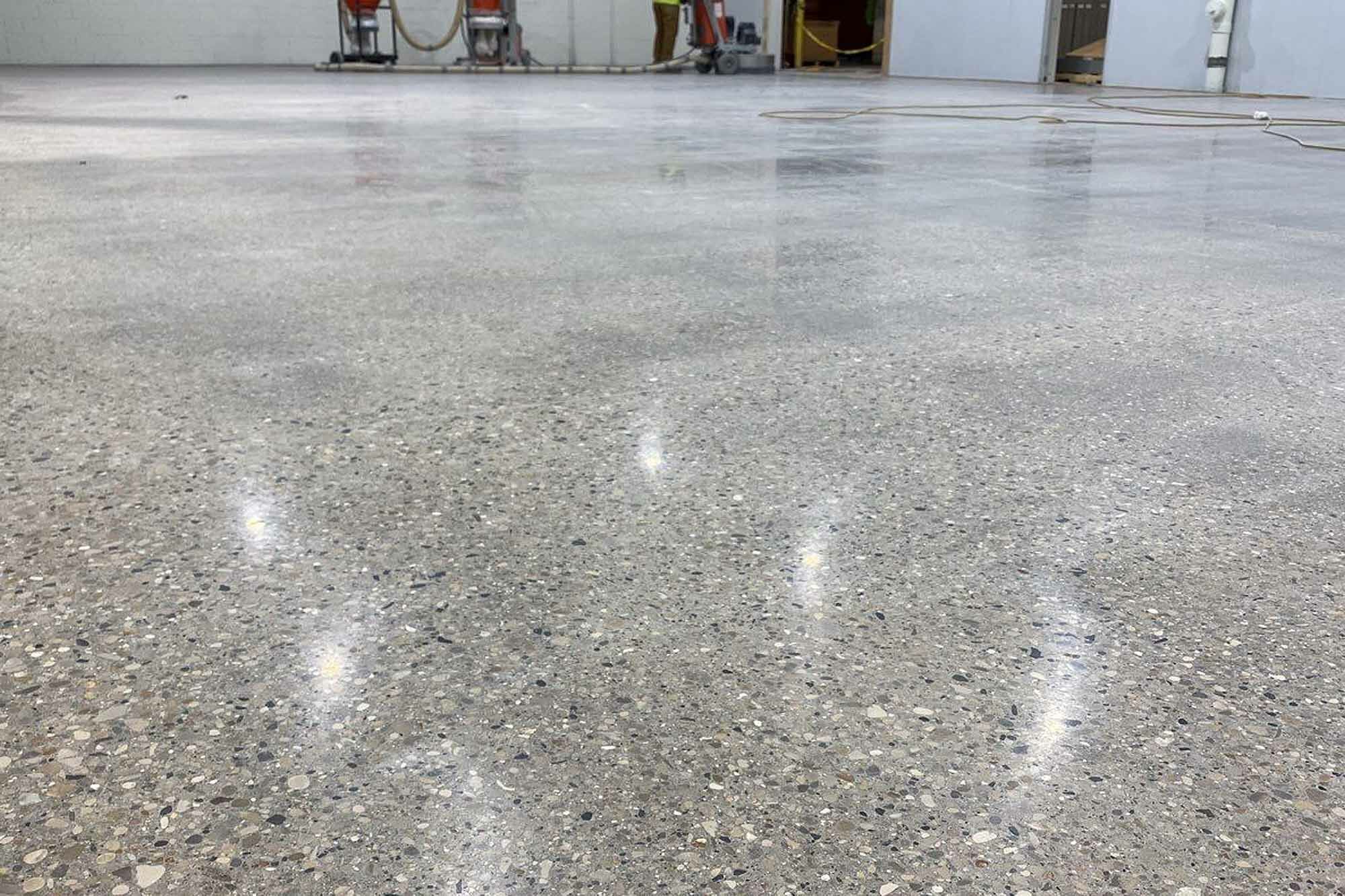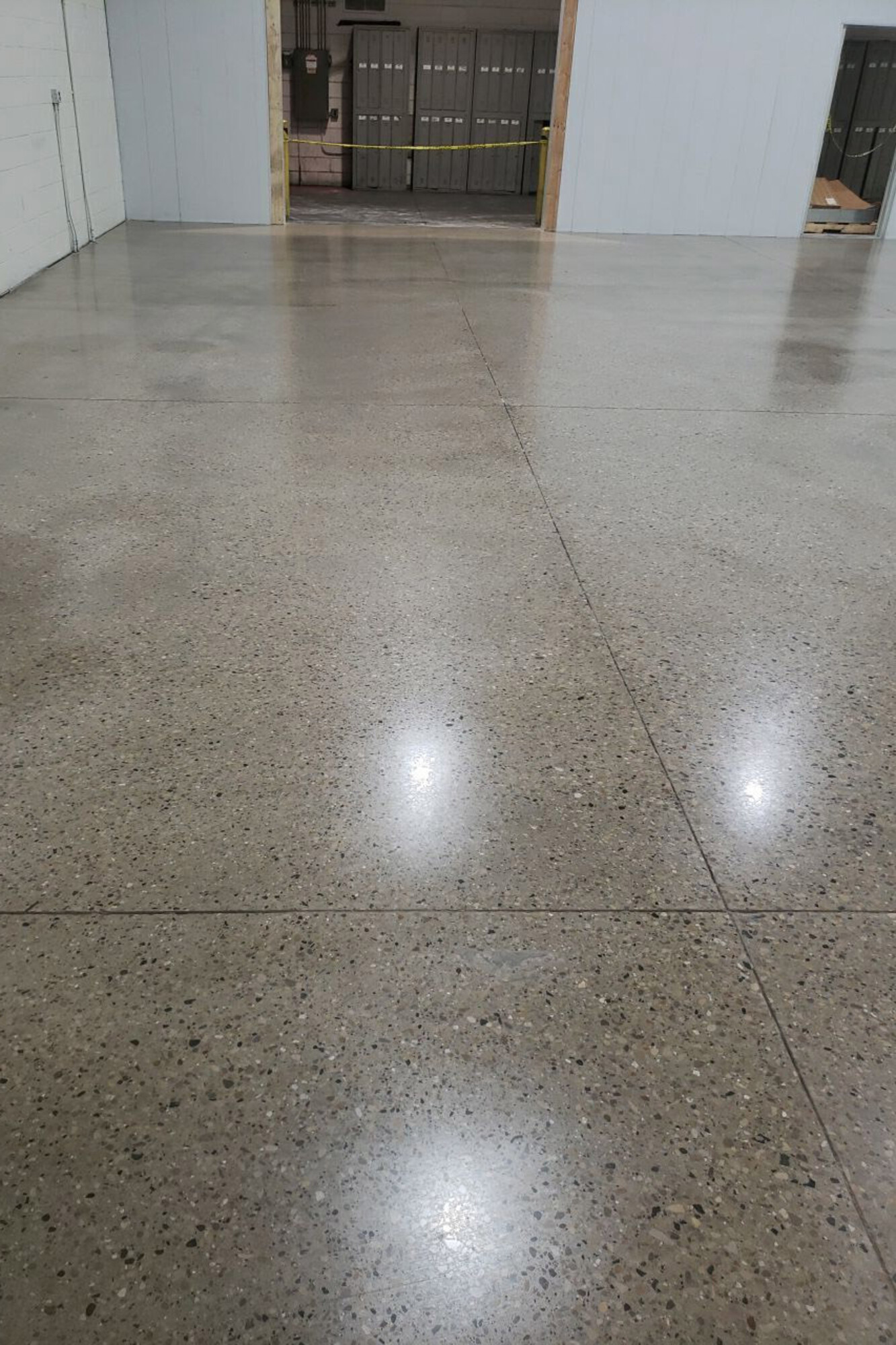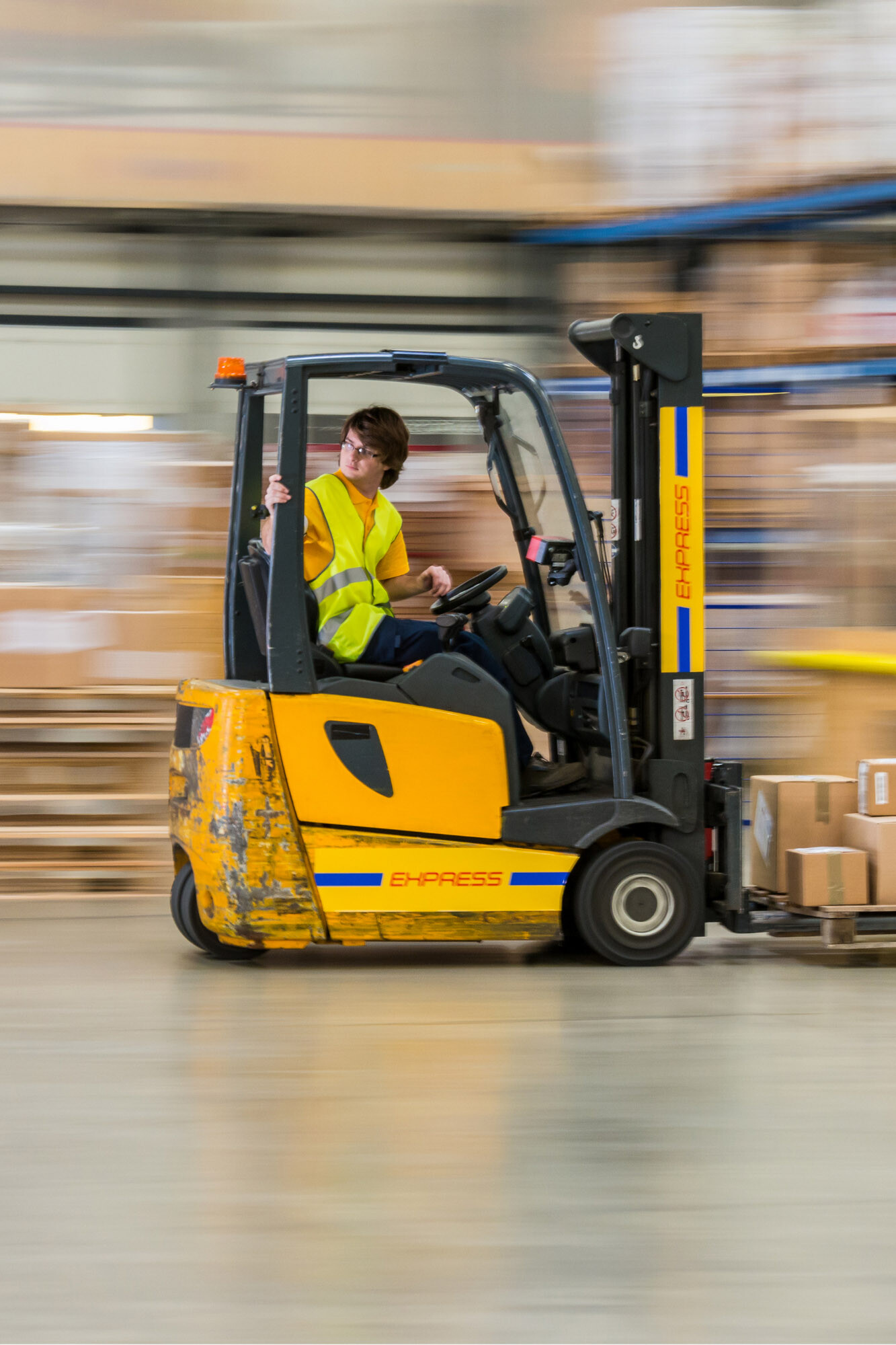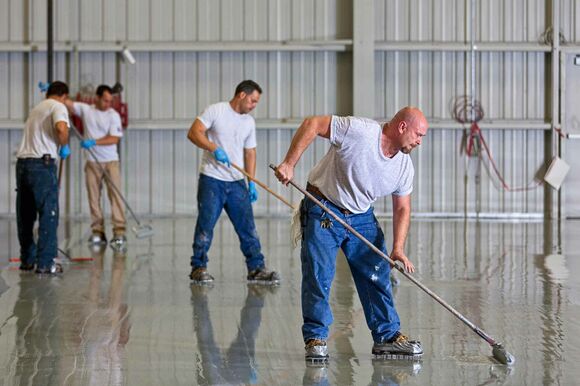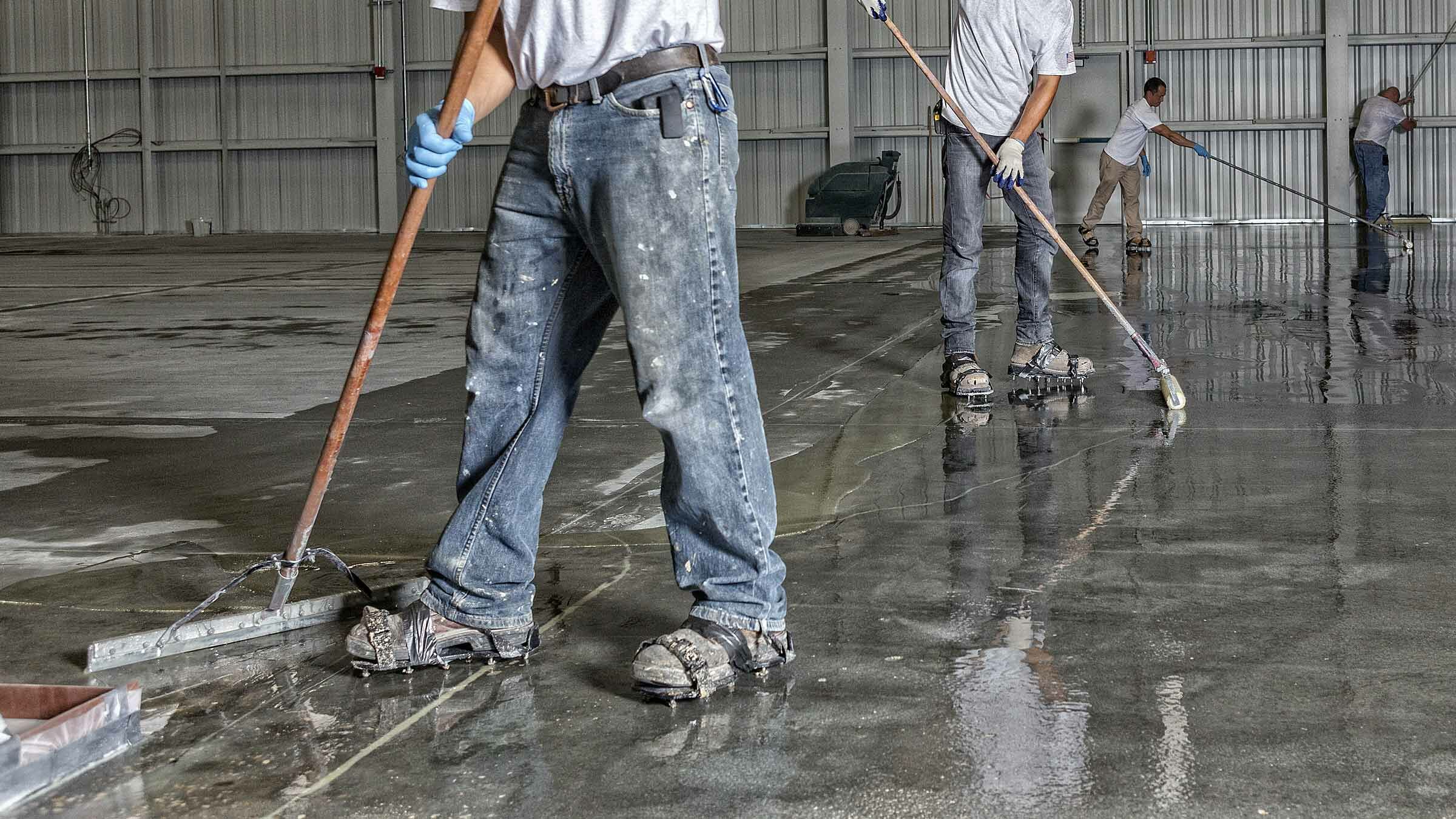Contact a Concrete Flooring Expert to Learn More
Look around, and you will see concrete everywhere. This human-made material is most commonly used for sidewalks, driveways, countertops, and floors, but it is also an important construction material for bridges, drain pipes, curbs, and buildings.
Concrete generally consists of aggregate (sand, rock, or gravel), water, and cement. When it is blended together, the product becomes a thick paste that can be poured and molded into shapes, if need be. Then gradually, over several days, the mixture will dry and harden. Depending on how it will be used, a concrete hardener or densifier is applied to finished surfaces.
What Are The Benefits of Using Concrete For Flooring?
As mentioned above, there are only three ingredients needed to make concrete. The ratio of the water, aggregate, and amount of cement added determine the final product's characteristics. For example, a lower water content will produce a stronger and harder concrete finish. The proportion, texture, and shape of the aggregate can also affect how the concrete will look and react. Additionally, increasing the amount of cement used in the mixture can increase the final cost due to Portland cement's significant price.
However, compared to other building products, there are several significant benefits to using concrete for floors:
- It is non-combustible and inflammable.
- It is strong and can bear heavy loads.
- Before hardening, it is pliable and can be shaped and poured into molds.
- It is inexpensive to use, has few maintenance requirements, and lasts a long time.
- In addition to it being durable and sustainable, it also provides thermal mass. This can help reduce the building's energy consumption.
- And many more.
Adding a Concrete Hardener Is Beneficial in Many Ways
Both newly poured and existing concrete flooring can benefit by adding a concrete hardener to the surface. It will increase its breakage resistance and ability to repel moisture and allow the concrete surface to be buffed and given a beautiful sheen. However, it is important to note that while adding a hardener will not repair a crumbling, substandard, or weak surface, it can extend a good floor's overall lifespan.
The damaged and stained areas can be ground smooth, chips and divots filled in, and then the entire surface is finished with a concrete hardener to refurbish an older floor. These products also work well with several different decorative concrete techniques. Hardeners will alter the behavior of the concrete but will not change the look of the finished product.
Concrete Hardener Should be used to Ensure a Solid Finish
Not all concrete flooring is created the same. Some floors use steel fiber to reinforce the concrete. As mentioned earlier, some use less water or a higher percentage of cement in the concrete. Aggregate can vary in size from fine sand to stones and pebbles. Each of these factors can contribute to the strength and lifespan of the concrete floor. Understanding how your concrete was mixed will help you know what surface finish you should choose. Talking with a professional is recommended before making any final decisions regarding your floors.
What if you don't know the make-up of your concrete floor? It may pre-date the time when your business moved into the building, or you never thought to ask as it was being installed. A concrete hardener is highly recommended in this particular case to ensure it has a solid finish.
Because Concrete Alone May Not Be Enough
Most people understand that concrete is strong and tough, and, for the most part, it is. However, depending on the environment, just using plain concrete for your flooring may not be enough. Concrete is susceptible to stains and damage from liquids because it is also very porous. This can lead to aesthetic and structural issues, making it wear out sooner than expected. The lifespan of a concrete floor depends on how it is used and how well it's maintained.
Unfortunately, if not cared for properly, concrete is apt to crack, chip, and pit. Therefore, you need to add a concrete hardener or densifier to your final product for the longest-lasting wear.
What Is A Concrete Hardener?
A concrete hardener or densifier is added to the finished concrete floor's surface to prevent excessive chipping and cracking. When applied correctly, a hardener can prevent the flooring from getting damaged. These products can strengthen, preserve, and protect concrete surfaces through a uniform sealing and curing process.
A hardener is a transparent and permanent seal that protects the concrete from grease, salt, oil, water, and other contaminants and chemicals. Plus, adding a concrete hardener to the floor will prepare the surface for different floor coverings such as paint, epoxy, or adhesives. Freshly poured concrete is more resistant to deterioration, warping, and curling with an added hardener. A concrete hardener can also be applied to existing concrete after proper preparation.
How Does A Concrete Hardener Work?
When applied correctly by a professional, a liquid concrete hardener/densifier penetrates the floor's pores and creates a chemical reaction.
A concrete hardener works like this:
- Solid concrete flooring contains free calcium carbonate – also known as lime – which does not make it stronger or more durable. This is because not every bit of cement is reached by the chemical reactions that make it harden over time. The leftover bits make the concrete softer and easier to flake, crack, and chip.
- Concrete floors also have pores because of the evaporating water escaping through the concrete's top. This evaporation makes the surface weaker, with open pitting and small, nearly microscopic holes, enabling it to absorb liquids and soil, ultimately ruining the floor's surface.
- When dissolved in water, certain chemicals react with the free calcium carbonate. It forms C-S-H gel with silicate ions and is key to the chemical reaction and the hardening process.
- The gel fills the pores on the floor's surface. This leaves a hard shell and makes the concrete much stronger and more resistant to wear.
By nature, concrete is porous because, during the curing and drying process, pores are formed in the material by water evaporation. This interferes with the uniformity of the surface and makes the concrete more sensitive to stains and soil. Adding a hardener to the floor tightens the pores and closes them off to potential stains. Hardeners can be added within two hours of the cement being set; the setting will take a day or two, depending on the floor’s size and the air temperature. The chemical reaction with the free calcium carbonate will continue to work on the concrete's surface for up to two months after its application.
What Kinds of Businesses Use Concrete Hardeners?
Many kinds of businesses and industries use concrete floors. Each company uses them differently and has various reasons for adding densifiers and hardeners. Here are just a few examples of these businesses:
- Food processing plants
- Breweries
- Sports stadiums
- Retail stores
- Car dealerships
- Automotive plants
- Tool & Die shops
- Warehouses
- Heavy manufacturing
- Production floors
- Hospitals and clinics
- Restaurants and bars
- Cafeterias
- Animal clinics and kennels
- Schools
- Hotels
- Police and Fire stations
- Federal buildings and offices
Hardeners and densifiers create a barrier to protect floors from corrosion, freeze-thaw damage, stains, cracking and chipping. They block the concrete's pores to form a layer that reduces the absorption of liquids and prevents materials from passing through. Concrete hardeners can keep floors cleaner, more sanitary, and offer lower maintenance. Daily washing with a hose and mild soap can clean off most concrete surfaces.
Does Your Floor Need a Concrete Hardener?
Before using a concrete hardener, there are several things to consider. Is this floor in a warehouse or an industrial setting with forklifts and heavy machinery? Will there be lots of foot traffic because it's in your retail store? Is this floor in a restaurant kitchen with potential food and drink spills? Knowing how you will use your concrete floor and what you want it to look like is critical to selecting the right hardener. You can achieve your desired results for your circumstances and unique floor characteristics.
The risk of damage is high when your floor needs to work hard. Damage may happen when a large, wooden rate is dropped on the floor, snow and salt-covered boots walk across it, and vehicles drive on it. Even just heavy foot traffic can add a lot of wear and tear to a concrete floor. Based on light, medium, or heavy usage, different hardeners can be used.
Whether it's an industrial kitchen, a school, or an airport terminal, many facilities also require special flooring to keep them up to code, secure, slip-resistant, and safe. There are several solutions to meet these types of flooring needs as well. A primary concern for many business locations is safety. Preventing employees and customers from slipping and falling will save on effort, money, and time. Adding hardeners to new or updated floors can help many businesses improve their appearance and functionality. Safe and clean concrete floors will keep everything more secure and boost efficiency in their business spaces and offices.
Plus, whether the concrete flooring is old or new, adding a hardener is also the best way to eliminate dust in the air. This helps to control allergies or sneezing and watery eyes in customers, visitors, and employees.
What Is Your Floor's Expected Life Time?
As stated earlier, when taken care of properly, concrete floors can last for decades. Every business has to consider its unique situation and how its floors are being used, however. Extending a surface's lifetime even further depends on proper preparation, substrate strength, and continuous maintenance.
Several points to consider are:
- How long will you be in your current location?
- What is your budget for upkeep and repairs?
- What will/did you pay for the initial flooring?
A professional flooring contractor can advise you on what hardener and which application process is best for your situation. There are three choices of application: mid-cure, wet, or dry-shake. The contractor can explain each of them to you.
Set Your Concrete Floor Apart From the Rest With Creative Maintenance Solutions
A custom concrete floor can make your commercial space look completely different from everyone else's. Work with Creative Maintenance Solutions (CMS) and create a beautiful and unique commercial flooring surface to fit your business's needs. Choose from an array of design and color options. The best flooring solution will improve your business safety, cleanliness, aesthetics and, best of all, improve your working environment.
With their years of experience and incredible expertise at CMS, they know that every environment is unique and has special needs. When it comes to the right flooring solution, whether for a dog kennel, restaurant, or warehouse, CMS has just the right products and professional skills to provide your business with an updated, safe, and clean concrete floor.
The CMS team will work with your company to create a plan that is ideal for your space. They will assess your existing floors, examine their condition, and improve their safety and enhance the overall look and finish.
Choose Creative Maintenance Solutions – An Experienced Concrete Flooring Specialist
This Milwaukee-based company has gained a nationwide reputation for top-quality flooring solutions since 1989. Throughout the past three decades, their staff has continually maintained their knowledge to keep updated on all of the flooring industry's latest information.
Creative Maintenance Solutions has a proven record of customer satisfaction and quality workmanship. With clients from across the United States ranging from Fortune 500 companies to local businesses, CMS's professional staff provides real flooring solutions. They lay the foundation for a productive environment and can manage various budgets, needs, and deadlines.
Concrete hardeners and densifiers work extremely well, but only if applied properly, so always go with an experienced flooring specialist. Hardeners offer many benefits, including longevity of surfaces, increased durability, hardness, and protection.
As more businesses learn about concrete hardeners and how they work, the questions may switch from, “Should my company use a concrete floor hardener?” to “Why not use one?”
Contact Creative Maintenance Solutions to start your concrete flooring project today.
